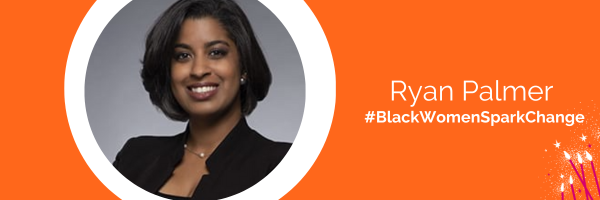
With an eye on diverse, sustainable grantmaking, Ryan is redefining how funding — and change — happens
“I have certainly had a zigzag of a career,” says Ryan Palmer, Director, Washington, D.C. Community Initiatives at the A. James & Alice B. Clark Foundation. After graduating from the University of Pennsylvania, Ryan worked in early childhood education before heading to law school. “In 2011 I came back to D.C. — D.C. is home for me — and I started doing community development work, then fell into fundraising and communications.”
Always mission-oriented, Ryan never worried about what came next. Instead, she focused on finding meaningful, fulfilling work — often work in support of children and families. As new opportunities presented, Ryan dove in, with an eye on making them her own. This, then, led to roles at the DC Promise Neighborhood Initiative, Excel Academy Public Charter School, and as Founding CEO of an urban agriculture startup.
In June 2015, Ryan joined Martha’s Table, a nonprofit that provides access to quality education, health, wellness, and family resources. Ryan spent nearly three years at Martha’s Table, leaving as Chief External Relations Officer.
“I really started to feel like I was pulling together a lot of threads that flowed through all of the twists and turns that my career had taken,” Ryan says. “At Martha’s Table, I led external relations — fundraising, communications, and community engagement, specifically. My years there were years of significant organizational growth and program expansion. I learned a lot about the inner workings of the sector and the relationship between philanthropy and nonprofits — and that’s when I really started to consider my next move.”
Creating a new approach to giving
With an eye on moving to the resource side — to finding ways to deploy resources more effectively — Ryan joined the A. James & Alice B. Clark Foundation, overseeing their DC community initiatives. She’s been at the Clark Foundation since May 2018.
“It’s an exciting time at the Foundation,” she says. “We are on a sunset timeline now because Mr. Clark, who passed away in 2015, believed in focusing on today’s challenges. The Clark family has always been committed to giving back to D.C., which has given them so much.” In spending down those funds, Ryan says, the team has its eye on programs that will have immediate impact and be sustainable in the long term.
Since joining the Clark Foundation, the bulk of Ryan’s work has centered on working with existing partners, new partners, and the board to define the organization’s priorities in DC.
“This has been such a unique philanthropic opportunity, from the spend down to the focus on sustainability, and the willingness of our trustees to take risks and jump into multi-year grantmaking opportunities with some very significant investments. Now my portfolio includes a programmatic focus on parent-child health along with infrastructure investments in community anchor organizations to support revenue generation and operating efficiency.” As part of her work, Ryan supports grantees through both funding and thought partnership.
One project in her portfolio — and particularly close to her heart and her early childhood background — involves a nearly $100MM investment in leaders in hospital- and community-based health to establish a coordinated, comprehensive, integrated, and culturally-responsive system of perinatal family support.
“With this and with every project, D.C. is home for me. And in this role I get to work with brilliant people,” Ryan says. “This parent-child program is unique in that it’s inextricably tied to outcomes for Black women in my hometown — so it’s even more fulfilling because of that.”
Looking ahead, Ryan is eager to continue her work at the Foundation and coordinate community-changing initiatives.
“It seems that we’re in the midst of a necessary shift in the philanthropic community towards leveraging investments instead of duplicating the wheel,” she says. “With that, there’s also been an increased interest in lightening the burden on grantees. We are focused on finding the right people to do the work and trust they’re going to do it. So, we are looking at more ways to support grantees rather than dangle funding as a punitive measure. We still have a long way to go, but change is happening and it’s a good thing for grantees and for the D.C. community.”
This, Ryan says, is the critical step in effecting change in philanthropy, fundraising, and communities at large.
“Bottom line: we have to be realistic about how change happens. We have to find ways to navigate various interests and ensure everyone is respectful and respected, and that everyone sees themselves in the solution,” says Ryan. “That’s the only way that things get pushed forward.”
